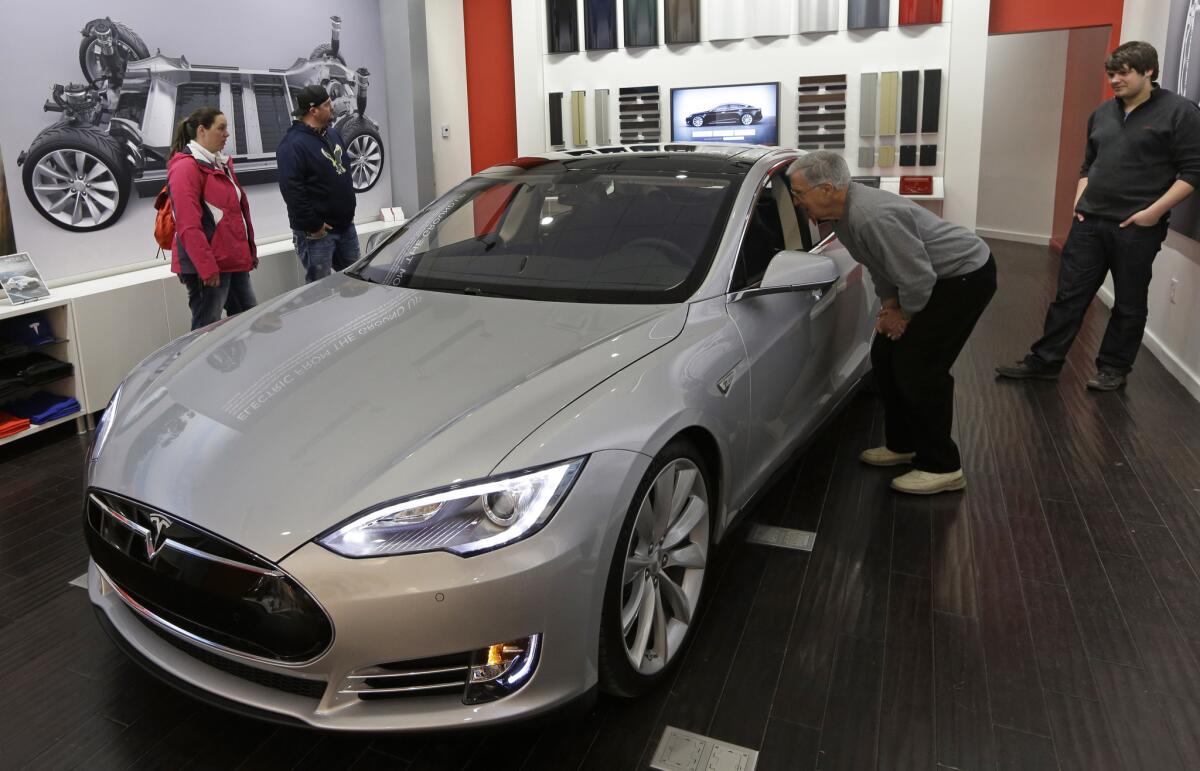Missouri legislation would block Tesla Motors’ direct-sales efforts

- Share via
Auto dealers have picked another fight with electric car company Tesla Motors Inc., this time in Missouri.
Late in Missouri’s legislative session a lawmaker proposed new language in an existing bill that would allow the state’s consumers to purchase vehicles only through franchised dealers. The legislation passed in the state’s Senate earlier this week and is now moving to the House for a final vote.
The original bill has been kicking around for months and was designed to change some of the regulations for all-terrain and off-road vehicles and create a personalized license plate program for female military veterans.
Tesla blamed lobbying efforts by auto dealers for the amendment.
The automaker has been fighting dealers and their lobbyists in multiple states over its efforts to sell electric cars through company-owned Apple-like stores rather than through traditional dealer franchises. Some local dealers see the efforts by automakers to sell through company-owned stores as a threat to their businesses.
Some states, including California and Missouri, allow automakers to open their own outlets if they don’t already have existing franchises for their brand, Tesla said. But others, including Texas, Arizona and New Jersey, ban direct sales outright. Missouri dealers want their state to join that group.
“This is worse than a mere case of dealers trying to protect an existing monopoly — this is a case of dealers trying to create a monopoly,” Tesla said in a statement.
The Republican lawmaker who introduced the Missouri legislation, Rep. Glen Kolkmeyer, did not return phone calls and emails seeking comment.
Tesla has a store and service center in St. Louis that has a staff of 15. The automaker said it had spent about $2 million on the facility and planned a second $1-million service center in Kansas City, Mo., that will employ another 15 people.
Car dealers are misguided in their attempts to block Tesla’s sales model, said Diarmuid O’Connell, the company’s vice president of business development.
“We didn’t start this to eviscerate the dealer model,” he said. “We did this to promote this new novel and innovative electric vehicle technology to a market that is unfamiliar with it and requires education.”
Auto dealers will sell about 16 million vehicles in the U.S. this year and all but a few tens of thousands will have gasoline- or diesel-fueled engines. Because their sales are so overwhelmingly dominated by cars with internal combustion engines, the dealers have little time or financial incentive to hand sell a new technology auto such as Tesla’s Model S sedan, O’Connell said.
Company-owned stores allow Tesla to keep control of its sales channel and the marketing process, he added.
“It takes a lot of time and many visits to get people comfortable with the technology and the company itself,” O’Connell said.
Tesla has sold just 6,100 of its Model S cars in the U.S. so far this year. The vehicle sells for from $71,000 to more than $100,000, depending on options. The company plans to come out with the Model X, a sport utility vehicle, next year and a less expensive sedan in 2017. It makes the vehicles at a factory in Fremont, Calif.
O’Connell also questioned any economic justification for requiring that there always be a go-between in the sale of a car. With the exception of alcoholic beverages there’s no other mass-market consumer product where such a distribution system is mandated by law.
“Kudos to the dealer system for holding out an anachronism in our economy, but that doesn’t make it right,” O’Connell said.
Tesla is attempting to reverse the New Jersey law and has battled dealer groups in other states over the same issue.
The franchised new-car dealership system dates to the start of the U.S. auto industry, when hundreds of manufacturers were fighting for market share. Setting up showrooms was expensive and time-consuming. So automakers sold other entrepreneurs the right to market their cars in specific cities. Early car buyers liked the set-up because it provided them with a local business to take their vehicles to for service and repairs.
Over time, car dealerships became crucial sources of employment and tax revenue for local communities. To prevent manufacturers from opening their own stores and undercutting neighborhood dealers, states developed laws governing the franchise relationship.







